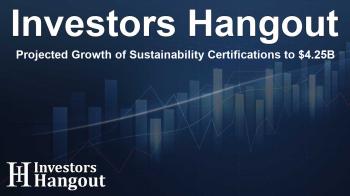Projected Growth of Sustainability Certifications to $4.25B

Sustainability Certification Market: A Growing Trend
The sustainability certification market is on track to reach an impressive USD 4.25 billion by the year 2030, reflecting a robust growth from USD 3.10 billion in 2025. This anticipated growth translates to a compound annual growth rate (CAGR) of 6.5% during this period. The increasing focus on environmental compliance and sustainability initiatives is a substantial driver behind this upward trajectory.
The Role of Technology in Certification
Innovations in technology play a key role in the evolution of the sustainability certification market. The integration of digital verification technologies and AI-based analytics has transformed how companies approach sustainability compliance. Various sectors, including energy and emissions management, mobility, and infrastructure, are adopting these certifications to comply with environmental regulations before commencing production.
Market Scope and Dynamics
This market is characterized by essential components such as growth rate, revenue forecasts, competitive landscapes, and ongoing trends. The industrial segment of the market is projected to hold significant market share during the forecast period. This is predominantly fueled by rising pressure on companies to minimize their carbon footprints and adhere to environmental standards. Accordingly, sectors like manufacturing and construction are increasingly investing in certification solutions to assure a commitment to sustainability standards.
Challenges Faced by the Sector
Ensuring credibility within the sustainability certification market remains a significant challenge. Companies are often accused of greenwashing if their practices don’t match the certifications they claim to hold. Moreover, the demand for ethical sourcing and responsible production is compelling firms to seek reliable certification solutions, which in turn fosters an increased emphasis on sustainable supply chains.
Supply Chain Sustainability on the Rise
The emphasis on supply chain sustainability is escalating, leading to an impressive CAGR in this particular domain. Companies are motivated to implement sustainability certifications throughout their supply chains to maintain and regulate supplier practices regarding environmental performance. This shift stems from the increasing consumer demand for transparency in sourcing and production practices.
Regional Market Insights
The Asia-Pacific region is positioned to capture the largest market share in the sustainability certification landscape over the coming years. This is largely attributed to the rapid industrialization in major countries, accentuated by stringent environmental regulations. The region is home to numerous manufacturing and energy-intensive sectors, which are forging ahead with sustainability certifications due to mounting consumer expectations and regulatory pressures. Government initiatives, particularly in regions like China and India, are further promoting the adoption of these certifications.
Key Players Shaping the Industry
Prominent players in the sustainability certification domain include firms such as SGS SA, UL LLC, TUV SUD, Bureau Veritas, and DNV GL. These organizations are capitalizing on a mix of organic and inorganic growth strategies, which include service launches, expansions, and strategic partnerships that enhance their market footprint.
Future Outlook of the Sustainability Certification Market
The future of the sustainability certification market appears promising as the global push towards reducing carbon footprints intensifies in various sectors. By leveraging innovative technologies like blockchain and AI for better compliance tracking and reporting, the market is set for significant growth. Companies are increasingly recognizing the business opportunities presented by sustainable practices, making these certifications essential for long-term viability and success.
Frequently Asked Questions
What is the expected market size of sustainability certification?
The sustainability certification market is projected to reach USD 4.25 billion by 2030.
What technologies are influencing the sustainability certification market?
The use of digital verification technologies and AI-based analytics is significantly shaping this market.
Which regions are leading in sustainability certification?
The Asia-Pacific region is expected to dominate the sustainability certification market due to rising industrialization and regulatory frameworks.
What challenges does the sustainability certification market face?
Key challenges include the risk of greenwashing and ensuring the credibility of certifications.
Who are the major players in the sustainability certification market?
Major players include SGS SA, UL LLC, TUV SUD, Bureau Veritas, and DNV GL.
About The Author
Contact Lucas Young privately here. Or send an email with ATTN: Lucas Young as the subject to contact@investorshangout.com.
About Investors Hangout
Investors Hangout is a leading online stock forum for financial discussion and learning, offering a wide range of free tools and resources. It draws in traders of all levels, who exchange market knowledge, investigate trading tactics, and keep an eye on industry developments in real time. Featuring financial articles, stock message boards, quotes, charts, company profiles, and live news updates. Through cooperative learning and a wealth of informational resources, it helps users from novices creating their first portfolios to experts honing their techniques. Join Investors Hangout today: https://investorshangout.com/
The content of this article is based on factual, publicly available information and does not represent legal, financial, or investment advice. Investors Hangout does not offer financial advice, and the author is not a licensed financial advisor. Consult a qualified advisor before making any financial or investment decisions based on this article. This article should not be considered advice to purchase, sell, or hold any securities or other investments. If any of the material provided here is inaccurate, please contact us for corrections.

